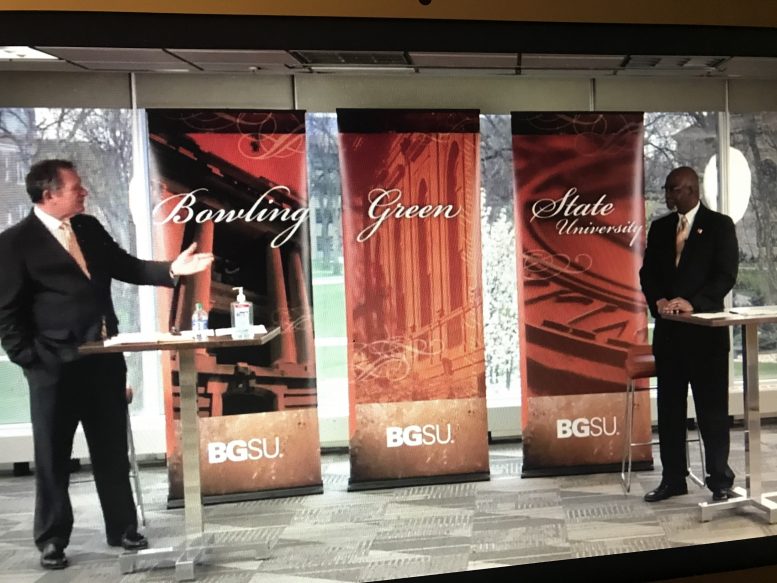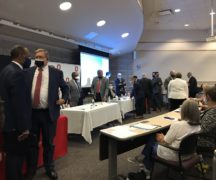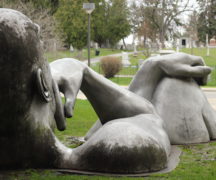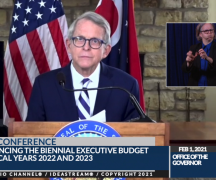By DAVID DUPONT
BG Independent News
Bowling Green State University will emerge from the COVID-19 pandemic better than before.
That’s how Provost Joe Whitehead, and President Rodney Rogers concluded a 90-minute long town hall meeting for the university community.
It’s difficult to plan and move forward at this point, Whitehead said. “But it will subside. If we keep planning and keep working then we can actually come out … better than we were before.”
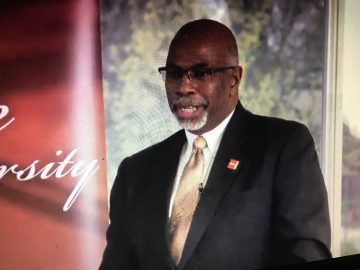
The two spoke from University Hall, overlooking the Bowen-Thompson Quadrangle. Socially distanced at podiums, their remarks were streamed over Facebook Live and on the president’s webpage, where the event can still be viewed.
Most of the session was devoted to answering questions, many from parents.
Rogers reiterated his hope that the university would have face-to-face classes in the fall, though not in the same way as before.
This may involve classes in which a number of students are taught online, and then meet face to face in smaller discussion groups that allow for social distancing.
BGSU personnel are also considering how residence halls may need to change to reduce the risk of COVID-19. There may not be as many choices in terms of rooms and occupancy.
For students living off campus, Rogers said, the university wanted to be “part of the solution” as they struggle with the decision of whether to sign leases for next year. Those arrangements, though, are between private parties.
Rogers said that the university has been able to assist students, including helping pay for rent, utilities, and food, through its Student Emergency Fund, which has raised more than $117,000 and given out 558 grants as of April 23. The university is looking to replenish that money, and may be able to use money from the federal CARES act to assist students.
Whitehead said all specialized course fees were being analyzed to determine “whether students were able to benefit or not” from the materials or activities they fund. A decision will be announced.
Falcon dollars will be refunded to seniors and other students can apply to have them refunded, Rogers said. Otherwise students will be able to roll them over to next semester.
Whitehead said that the Career Center was in contact with all students on track to graduate in May, to help them navigate what’s expected to be a very difficult job market. The center is also in touch with employers to get a sense of whether they will be hiring and whether plans for internships and co-operative learning will be in place.
And if they are not available, the university personnel are looking for alternative ways students can meet those requirements.
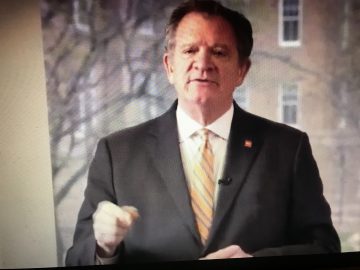
Rogers also was called on to explain how the university came up with the figure of $27 million for the expected shortfall for the Bowling Green campus, and $2 million for the Firelands campus.
He said it was a combination of the anticipated 20-percent reduction is state share of instruction, and an expected decline in enrollment because of financial hardships students and their families were facing.
The university, he said, was open to suggestions from anyone in the university community.
No mention was made of the possibility of laying off some non-tenure track faculty with three or less years of experience at BGSU or unpaid furloughs for administrators and staff.
The budget reduction “is not insignificant,” Rogers said. “There will be an impact on some of the current employees of BGSU.”
He said while he regrets having to make those decisions, they will be arrived at carefully and thoughtfully. “Our goal is to make sure the institution is positioned for continued success.” That success hinges on having a strong academic program that fosters student success.
The university has been pushing the creation of programs in high demand fields such as nursing, health care, advanced manufacturing, and applied engineering, Whitehead noted. The coronavirus pandemic has highlighted the need for people educated in these fields. The university has to figure out it can continue to do as much or even more for students though spending less, Rogers said. That means the elimination of “duplicate initiatives” or initiatives that haven’t lived up to their promise. He did not offer any specifics.
The university is seeking cost saving suggestions from the entire university community, he said. One possibility is a “flatter organization.”
If reducing some administration will save money without detracting from the quality of the student experience and the university’s research agenda, then that should be done.
In conclusion, Rogers said: “We’ve got to make sure that we continue to work together, that we learn from each other we have empathy for others that we are thinking about what we are going to be on the other side of the COVID virus because it will make us stronger. It will make us more adaptable. … We’re in this together, focused on giving students a world class experience with faculty and staff aligned to deliver that.”

